The Write Way…(because there is no ‘right’ way)…
January 17, 2008 by A Slice of Orange in category Archives tagged as The Write WayMaking a living at writing isn’t always easy. There are dozens–probably hundreds–of writers who are working toward that goal as we speak.
WRITE ANGLE
January 15, 2008 by Rebecca Forster in category The Write Life by Rebecca Forster tagged as Rebecca Forster, Write Angleby Rebecca Forster
When the clock struck twelve on New Year’s Eve I kissed:
a. An Italian woman
b. Five French men
c. My husband
d. My mother
e. All of the above
The answer is “e”, all of the above.
We went to Paris over Christmas, a long-planned trip to celebrate my son’s graduation from college and my mother’s 83 years. On the plane, I met two ladies from Baltimore who invited us to their rented apartment for New Year’s Eve. We didn’t exactly forget about them, but the ensuing week was filled with chasing down all the sites of Paris and, suddenly, it was time go home.
On New Year’s Eve, we dined in a tiny restaurant where we sat close enough to a family from Ohio to know that their son wasn’t a big fan of escargot and their daughter was angling for an unaffordable Parisian wedding gown. My family and I talked about all the nice things we’d seen, the lines we waited in. Ours had been a good trip but I wasn’t sure it was memorable.
Ambling back to the hotel, fully intending to pack and get a good night’s sleep, we advertently stumbled upon the Rue du Mond – the street where the Baltimore ladies were staying. To call it a street, though, was generous. This was an alley and it was shadowy, cold and foreboding. High rock walls lined each side, above us towered darkened apartments. Still, we ventured in, rang what we assumed was a bell in an ancient green gate. When no one came, high-tailed it out of there, convincing ourselves adventure was not on the agenda.
But it was.
A note was waiting at our hotel. Baltimore had tracked us down! We called the number they left and, a few minutes later, armed with a security code and a warning that we would have to hunt for lights in the old courtyard, we traipsed back to the alley. Behind the green gate were three flights of stairs that had been worn into waves of uneven stone over generations. They felt treacherous and we went slowly. Finally, we found ourselves in a 16th-century apartment in the company not only of the two women from Baltimore but their Italian friends.
My husband ducked under doorways meant for men who stood at least a foot shorter than he. One of the Italian ladies spoke German. She and my mother were off, chattering in a language I don’t understand. I exchanged stories with the ladies from the plane. We drank wine and champagne and, at ten minutes to midnight, in a flurry of winter coats, we dashed for the Pantheon where we would be able to see the lights on the Eiffel Tower as midnight struck.
We were too late. A great roar resounded throughout Paris as people greeted the New Year. One of the Italian ladies grabbed my husband for a kiss. The other was bussing my mother’s cheeks. We passed one another along – friends for that night – wishing each one well. Arm-in-arm we made it to the square just as a group of drunkenly joyous and extraordinarily handsome young men burst out of a bar. The kissing started all over again. My mother giggled and raised her cheeks, my husband slapped them on the back as if they were his sons. We babbled good wishes in poor English and even worse French.
And then it was done. The night was over. The champagne was gone. We were all headed home, but now it was with memories. They wouldn’t be of churches and museums, palaces and restaurants but of New Year’s Eve and the unexpected.
I spoke to two women on an airplane, called a number in a note, walked through a green gate in an ancient wall, drank champagne on a Paris street, returned an Italian woman’s kiss on the cheeks, held my husband’s hand while I watched the lights of the Eiffel Tower, saw my mother turn back into the girl she once was as a handsome young man took her in his arms and wished her a Happy New Year with a kiss.
In the dark Paris night, in the course of only a few hours, I was reminded that stories are memorable only when filled with the unexpected, with choices, with characters who are larger than life. Good stories do not set us aside as spectators but draw us into the action. A good author, weaves into their story all the elements of the moment: the feel of the air, the sounds of the night, the touch of another person. Those are the things that etch a story into memory, a heart, a mind.
I will think of Paris when I find myself at a loss for words. I will make my characters speak, allow them an adventure, let them open the green gate to see what lies behind it.

Rebecca Foster
Rebecca Forster
rebeccaforster@aol.com
http://www.rebeccaforster.com/
HOSTILE WITNESS
SILENT WITNESS
PRIVILEGED WITNESS
Eye on Hollywood
January 13, 2008 by A Slice of Orange in category Eye on Hollywood by Bobbie Cimo tagged as Bobbie Cimo, Eye on HollywoodExercising with the Stars
by Bobbie Cimo
Well, I know you’ve all heard of the hit ABC TV show, Dancing with the Stars (DWTS). Here’s a bit of trivia . . . did you know that DWTS is actually shot on the CBS lot? If you listen carefully to the ABC Entertainment News, you’ll hear them refer to the location of their show, as being done in the Fairfax District. Big surprise, it’s really done at CBS. No need to be giving free publicity to another network–that would be like Macy’s telling you to shop at Gimbels Well, they did in Miracle on 34th Street . . . but that was fictional and look what happened to Gimbels at the end –free publicity and all, they ended up going out of business.
When DWTS is in Production it makes it difficult for us CBS employees to find a good parking space. Production people take up all the best spaces. So I usually end up parking far from my office, but close to the DWTS studios. Which mean it’s not unusual for me to see either a Derek, Maks or Cheryl (the regular dancers) or an Ian, Billy Ray, Cameron, or Heather Mills, (the celebrity dancers) practicing their turns or stretches on the sidewalks between the studio and their trailers. Or to see some of the dancers in a huddle, puffing away on their cigarettes. Yes, those young professional dancers who seem to be the embodiment of living a perfectly healthy life style, have some serious habits they’d probably like to break. And if you’re going to ask me to name names, forget it. To borrow a line from some B-rated gangster flick of the Forties, “I’m no dirty rotten stool pigeon.” Besides, with all that smoke, I never have gotten a clear view to tell who was actually holding the cigarette or who was just stand there to keep the others company. But it did make me wonder if these young, healthy-looking dancers had made a 2008 New Year’s resolution to do better on their life style choices.
I, for one, every year, promise myself this will be the year that I will lose weight, eat healthier and of course, exercise. Eating healthy and losing weight go hand and hand. If I can manage to do one, the other will surely follow. It’s the exercise one that I’m not so sure I’ll ever be able to master.
If anyone had to ask me, I’d be the first to tell you I’ve never been a mover or a shaker. Some days I barely feel like I can walk, let alone exercise. Oh, like the rest of you, I’ve held membership to health clubs, joined walking groups . . . have had a treadmill (even rented one), had a real bike, a stationary bike, a step-climber, stretch bands, a jump robe, ThighMaster, mini-trampoline, exercise videos, and a partridge in a pear tree.. Unfortunately, I was unsuccessful with all of them.
Then there was the time I exercised with the stars.
Years ago, when Carol Burnett had her weekly show at CBS, she decided it would be nice to share her exercise regiment with all the rest of us ladies. I hesitated to go at first because wasn’t thrilled at the thought of giving up my lunch hour (where I’d rather be in the commissary to do some serious star gazing). I also wasn’t eager to change into leotards and a pair of tights, get sweaty, then rush to the showers before hurrying back to my regular office work. But when I went to my first class and she told us how her hip measurements went from size 43 to 35 inches (please Carol forgive me if I have this wrong), I knew I had to be there. Keep in mind all I had to do was lose a miserable ten pounds at the time, and I would have been perfect . . . if only that was the case, now.
Carol is really a lovely person, but like most comedians that I have had the pleasure of knowing, they’re different than you think they might be. We get so used to seeing them on TV, and having them in our living rooms, we start believing we know exactly how they’ll act in person. When you see them in person, it’s almost a natural reaction for you to want to throw your arms around them and say “How the heck are you?‖ thinking that they’ll respond with the same easy-going manner as the characters they’ve portrayed on TV. But in truth, most comedians are very serious-minded and even a bit on the quiet side.
This is not to say Carol didn’t display some sense of humor. She did. But just on a different level than we were used to seeing on TV. An example of this is the music she chose for us to exercise by. When we would lie on our backs, legs in the air, doing the famous scissors exercise, the song she chose, which never failed to get a giggle from us, was “I Want To Be Loved” preformed by Dean Martin’s singers, The Golddiggers. I still have the album. If you’re not familiar with the song, I can only tell you their rendition is very sensual and has a lot of deep sighs and sexy “Ah’s” in between the lyrics. “I want to be (long deep sigh here) loved. I want to be thrilled (Ahh) by your caress.” A lovely song to hear, while on your back with your legs apart.
Carol did fabulous with the teaching and was very dedicated to us. But one day I had to go to her to tell her of my neck problems. She was very quick to offer me the name and phone number of her yoga teacher. An 86-year-old woman who could do more bends than a pretzel. Carol said she had helped her and was certain she could help me. So rather than risk any future neck problems, off to the yoga lady I went.
The only thing I was good at in yoga was saying my “Oms.” You know that electrifying nasal sound you make at the start and finish of the classes? No, I never ran into any stars at yoga. I did miss out on seeing Lana Turner (the original star of The Postman Always Rings Twice) being interviewed by Mike Douglas. I had to leave work early to make it to my yoga class on time. A decision I regret to this day. Yoga did very little for me or my neck, except for those occasional times when I became so relaxed that I fell asleep and was caught snoring in class. I couldn’t even master the Lotus position successfully. Bottom line — I was a failure at yoga.
A few years later, I began regular classes at the Ron Fletcher Pilate Studios. Ron was a dancer who learned the art of Pilates from German-born Joseph Pilates. Some of Ron’s customers were considered the rich and famous of Beverly Hills. Except me –the poor and unknown–who required special attention because I was so uncoordinated. Within a few months, nothing surprised me more than when I was able to stand on my shoulders! Eventually I was even able to hang upside down by my feet. Somehow this regiment ended up realigning my whole body and besides putting me in the best physical condition of my life, it gave me the best shape of my life. As for the stars, there were many but the one that comes to mind and who I saw on a regular basis was Katherine Ross (star of Butch Cassidy and The Sundance Kid and wife of actor Sam Elliott). I did enjoy the classes, however my neck didn’t, so I had to quit.
That was the end of my experiences of exercising with the stars. Or so I thought until recently. A few months ago, while sitting outside of my beauty salon, I looked down and noticed I was wearing two different shoes. Same style, different colors. The lady I was talking to, thought I was being cool and was starting a new trend. Me, I was devastated by my own stupidity. Luckily, I had a spare pair of shoes in my car.
They say all things happen for a reason. Maybe so. Otherwise I would have never gone to my car at that particular time. Normally, I would have left later. And if I had, I would have missed the sound of the disco music, the sight of people — in all sizes and shapes — as they vigorously bounced around to the beat. I would also missed hearing the words of encouragement coming from a world-famous exercise guru. The place was “Slimmons.” The instructor was Richard Simmons.
So now, twice a week you’ll find me sweating to the Oldies with Richard as my instructor. Unless someone like Ricki Lake comes in with Access Hollywood, and a camera crew. They did and I walked out. I don’t need to be seen, by the world, on TV, doing my aerobics.
I can’t claim to have always been a fan of Richard Simmons. Never thought much about him one way or the other. Until you ask me now. He’s probably the only person who can claim that he got me moving.
I also learned what a kind and giving person he is. Whenever he sees me, he gives me a warm welcome and kisses me on each side of the face, to make me feel like I belong. And he always tells me I’m doing a good job even when I know I’m not. He’s being kind because he knows I’m really trying. And he wants to encourage me.
Just to give you an image of what I look like taking his classes, picture Lucy Ricardo trying to pass herself off as one of Ricky’s chorus girls but not knowing the routine. They go running to the left, I run to the right. They turn one way, I turn the other. When I finally catch up to where they are, they’re on to something else. And this is after two months of me practicing. But the one thing I am doing is moving.
I may never be as thin as I used to be, or as elegant as some of the dancers I have seen on Dancing with the Stars, but the one thing Richard has promised all of us is if we move, we won’t end up like those people we see in grocery stores driving those carts around rather than walking. He said he can promise us that most of them probably never used their muscles when they were younger. I have a tendency to believe him. And as long as I keep that in mind, I’ll continue to be exercising with the stars.
********************************
Bobbie Cimo is the OCC/RWA Programs Director who has brought us such notable speakers as Dean Koontz, Tami Hoag, Jackie Collins and Robert Crais.
A Writer’s Pursuit…
January 12, 2008 by A Slice of Orange in category Archives tagged as A Writer's PursuitOf Research and Character Development
The Travel Channel. Discovery Channel. The Learning Channel.
I never realized how many times I draw inspiration for character development while watching some of the programs on these channels. No, seriously. This isn’t an excuse for me to sit in front of the TV and wish I had Samantha Brown’s job of traveling around the world…Or for me to think for the hundredth time that the French fry lovin’, clown fearin’ Anthony Bourdain just couldn’t be any cooler.
Well, okay. It is a little bit about Samantha Brown, but mostly it’s about what I learned about my characters after watching her show, “Passport to Europe.â€
In one of my favorite episodes, she visits Prague and eats in an absolutely stunning Art Nouveau café as she tells the story of a plate full of stale jelly donuts that sit on the counter and wait for someone to buy them for about $60 American. If a customer were willing to pay that much for the entire plateful, then that person has the right to take those donuts and throw them AT the other customers!
Where did this custom of the donut battles start?
Apparently, it was taken from a 1942 novel by a Czech author, Zdenek Jirotka, who wrote Saturnin, which is a humorous story that categorizes people into three different groups: 1) those who would just look at a plate of donuts 2) those who would think about throwing the donuts at people in the café and 3) those who wouldn’t think twice and would actually throw them at people in the café.
Now, from what I understand, the Café Imperial ended the tradition of the Battle of the Donuts in 2006, so don’t log on to Expedia and purchase your flight to Prague just yet! But, when I hear stories like this story, I always wonder…what other fun traditions have been started because of something written in a book or a poem?
So, tell me…In what category would your hero or heroine fall when looking at the plate of donuts? And what about you?
One, two, or three?
Can’t wait to read your answers… 🙂
Michele
 Michele Cwiertny writes dark paranormal and historical romance. To find out more about her please visit, www.michelecwiertny.com
Michele Cwiertny writes dark paranormal and historical romance. To find out more about her please visit, www.michelecwiertny.com
Jina does Dallas RWA
January 11, 2008 by A Slice of Orange in category Archives tagged as Confessions of a Podcast GoddessPart 1: Going to Dallas
by Jina Bacarr
Are you going to the RWA Conference in San Francisco this summer? Not sure? It’s a fabulous way to get together with your fellow romance writers, meet editors and agents, and those parties…
Well, what happened in Dallas at the last year’s convention doesn’t stay in Dallas because I’ve got it all on video.
So for the next few months I’m going to put up my video blog with podcasts from last year’s RWA convention at the Hyatt Regency Hotel in Dallas, Texas, including several with your favorite authors and OCC members!!
First up is Going to Dallas with the OCC gang. I shot this video blog on the Super Shuttle going to the airport than later at the terminal while we were waiting for our flight to Dallas.
What is video blogging, you ask? Video blogging is an interesting, spontaneous, and fun way to capture those memories when you’re “in the moment.” You don’t have to shoot a long, continuous stream of video. You can edit several scenes and/or photos together to create your video blog. Short videos work best. Going to Dallas is just over a minute and a half long including credits.
How do I get started? you want to know. It easy. You can put all your video and your photos into a free program like Windows Movie Maker (included with Windows), split the clips where you want to cut them, delete, then add fun transitions and/or fade in/fade outs. Adding music can be trickier and we’ll discuss that next month.
If you want a program that chooses the shots for you and adds the special effects you specify from their “styles” packages, then I recommend Muvee. This is an expensive program ($129.95), but you can download it for 21 days and try it for free to see if it works for you.
So sit back and enjoy Going to Dallas RWA.
Best,
Jina
Jina Bacarr is the author of The Blonde Geisha , Naughty Paris, Tokyo Rendezvous, a Spice Brief, and Spies, Lies and Naked Thighs, an erotic spy thriller, March 2008.
Jina writes erotic adventure for Spice Books.
“Get Caught in the Act!”
Affiliate Links
A Slice of Orange is an affiliate with some of the booksellers listed on this website, including Barnes & Nobel, Books A Million, iBooks, Kobo, and Smashwords. This means A Slice of Orange may earn a small advertising fee from sales made through the links used on this website. There are reminders of these affiliate links on the pages for individual books.
Search A Slice of Orange
Find a Column
Archives
Featured Books
ISN’T IT BROMANTIC
With his passion for romance novels, it was only a matter of time before Vlad wrote one.
More info →WHAT MY FRIENDS NEED TO KNOW
Would you break the girl code for love?
More info →Newsletter
Contributing Authors
Search A Slice of Orange
Find a Column
Archives
Authors in the Bookstore
- A. E. Decker
- A. J. Scudiere
- A.J. Sidransky
- Abby Collette
- Alanna Lucus
- Albert Marrin
- Alice Duncan
- Alina K. Field
- Alison Green Myers
- Andi Lawrencovna
- Andrew C Raiford
- Angela Pryce
- Aviva Vaughn
- Barbara Ankrum
- Bethlehem Writers Group, LLC
- Carol L. Wright
- Celeste Barclay
- Christina Alexandra
- Christopher D. Ochs
- Claire Davon
- Claire Naden
- Courtnee Turner Hoyle
- Courtney Annicchiarico
- D. Lieber
- Daniel V. Meier Jr.
- Debra Dixon
- Debra H. Goldstein
- Debra Holland
- Dee Ann Palmer
- Denise M. Colby
- Diane Benefiel
- Diane Sismour
- Dianna Sinovic
- DT Krippene
- E.B. Dawson
- Emilie Dallaire
- Emily Brightwell
- Emily PW Murphy
- Fae Rowen
- Faith L. Justice
- Frances Amati
- Geralyn Corcillo
- Glynnis Campbell
- Greg Jolley
- H. O. Charles
- Jaclyn Roché
- Jacqueline Diamond
- Janet Lynn and Will Zeilinger
- Jaya Mehta
- Jeff Baird
- Jenna Barwin
- Jenne Kern
- Jennifer D. Bokal
- Jennifer Lyon
- Jerome W. McFadden
- Jill Piscitello
- Jina Bacarr
- Jo A. Hiestand
- Jodi Bogert
- Jolina Petersheim
- Jonathan Maberry
- Joy Allyson
- Judy Duarte
- Justin Murphy
- Justine Davis
- Kat Martin
- Kidd Wadsworth
- Kitty Bucholtz
- Kristy Tate
- Larry Deibert
- Larry Hamilton
- Laura Drake
- Laurie Stevens
- Leslie Knowles
- Li-Ying Lundquist
- Linda Carroll-Bradd
- Linda Lappin
- Linda McLaughlin
- Linda O. Johnston
- Lisa Preston
- Lolo Paige
- Loran Holt
- Lynette M. Burrows
- Lyssa Kay Adams
- Madeline Ash
- Margarita Engle
- Marguerite Quantaine
- Marianne H. Donley
- Mary Castillo
- Maureen Klovers
- Megan Haskell
- Melanie Waterbury
- Melisa Rivero
- Melissa Chambers
- Melodie Winawer
- Meriam Wilhelm
- Mikel J. Wilson
- Mindy Neff
- Monica McCabe
- Nancy Brashear
- Neetu Malik
- Nikki Prince
- Once Upon Anthologies
- Paula Gail Benson
- Penny Reid
- Peter Barbour
- Priscilla Oliveras
- R. H. Kohno
- Rachel Hailey
- Ralph Hieb
- Ramcy Diek
- Ransom Stephens
- Rebecca Forster
- Renae Wrich
- Roxy Matthews
- Ryder Hunte Clancy
- Sally Paradysz
- Sheila Colón-Bagley
- Simone de Muñoz
- Sophie Barnes
- Susan Kaye Quinn
- Susan Lynn Meyer
- Susan Squires
- T. D. Fox
- Tara C. Allred
- Tara Lain
- Tari Lynn Jewett
- Terri Osburn
- Tracy Reed
- Vera Jane Cook
- Vicki Crum
- Writing Something Romantic
Affiliate Links
A Slice of Orange is an affiliate with some of the booksellers listed on this website, including Barnes & Nobel, Books A Million, iBooks, Kobo, and Smashwords. This means A Slice of Orange may earn a small advertising fee from sales made through the links used on this website. There are reminders of these affiliate links on the pages for individual books.









































